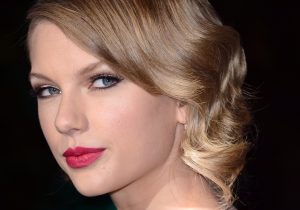When Fame May Not Lead To Fortune: Addressing Trademarks In Personal Names
Just because you're famous doesn't mean you don't have to establish secondary meaning in your name.

Taylor Swift (Photo by Karwai Tang/WireImage)
Recently, a computer consulting company called SwiftLife brought an action for trademark infringement against a interesting defendant. The company claims that its registered trademark “SwiftLife” for “consulting services in the field of design, selection, implementation and use of computer hardware and software systems for others” is being infringed by none other than the well-known musician Taylor Swift and her “SwiftLife” app. It’s no surprise that this computer consulting company is claiming that Taylor Swift’s social media app is likely to be confused with it’s computer-related goods and services, but it brings to mind another issue — trademarks in personal names. There is a lot to consider in recognizing personal names as trademarks, and more to obtaining and maintaining trademarks in them than meets the eye.
In an age of reality television and internet celebrity, it should come as no surprise that famous people and so-called celebrities would see to capitalize on their fame by obtaining trademark rights in their personal names. Although the roots of this protection may stem from the common law rights to publicity and privacy, in the United States trademark protection can extend to personal names (and even nicknames). The thing is, however, that such trademarks are not quite inherently distinctive. That is, the celebrity must establish that his or her name has come to be associated a the source of origin of the goods and services provided under the name. In other words, the famous person seeking to establish such trademark rights must demonstrate that secondary meaning has been established in and to the personal name.

Attention Buyer: Not All Legal AI Models Are Created Equal
Simple right? Not necessarily. As aforementioned, the relevant public needs to associate the personal name with the source of the goods or services associated with the celebrity for trademark rights to accrue in the personal name. We’re not talking about third-party product endorsement here, but rather, where the personal name is used on the product or service itself. For example, celebrity chef Emeril Lagasse had his name used in the mark “EMERILWARE” in association with a quality stainless steel cookware line. As a well-known chef and restauranteur, it is not hard for such an association to be made between his name and such products. Given that chef’s well-known affinity for garlic, it would not be stretch to have his name associated with a tomato pasta sauce either (it is). That said, can the same be said for using his name with any goods or services unrelated to what he is known for (such as a tablet computer)? Probably not — the name and product/service association is paramount. At the risk of being cliche, fame is simply (and most often) not enough.
When it comes to using personal names as trademarks, fame can only get you so far. Here are a few things to keep in mind, whether you are the celebrity seeking such protection or a potential licensee:
1. Be Uncommon. The more unique and unusual a name, the less likely it is to be confused with another. To the extent that a celebrity name, nickname, or moniker is less common, the better chance it has of being protectable as a trademark. Not everyone can have a name that rises to the level of a “Kanye” or a “Beyonce,” but when it comes to trademarks, the more unique and fanciful, the better.
2. Be Wary. If your client or company is seeking to license a celebrity name, the more unique and well-known the name with respect to the product or service with which is is associated, the better. That is, if the product or service your client or company seeks to use it for fits within the association. It is essential that the association between the name and the product or service be explored to determine if there is sufficient secondary meaning. As a licensee, you should feel that the rights holder can protect the grounds for the licensee (and by extension, the fruits of that license for which you have paid). Ignore such association at your own risk.
Sponsored

Mitigating M&A Cyber Risk: Pre- & Post-Acquisition Due Diligence

How To Maximize Productivity With Westlaw Precision With CoCounsel


New Report - Are Small Firms Achieving Their Legal Tech Goals?

The Ethical use of Generative AI

3. Be Diligent. As an extension to the exploration of secondary meaning, it only makes sense to be diligent regarding other uses of the celebrity name in conjunction with the specified goods and/or services. The more evidence of other uses of the celebrity name with similar products or services, the more likely it is that any contractual representations and warranties will be enforceable. Simply put, a little diligence can go a long way.
When it comes to trademarks in personal names, there are a number of things to consider from protection to enforcement. In the case of SwiftLife, it will be interesting to see if the plaintiff (having use of the trademark for computer consulting services at least as early as 2005) will prevail over Ms. Swift’s use of “THE SWIFTLIFE” in conjunction with the social app at issue (let alone for various retail store and entertainment services — uses for which her rights-holding company is seeking federal trademark protection as well). In any event, it is best to take the time to be proactive and address secondary meaning regarding such marks. Remember: when it comes to trademarks in personal names, fame is simply not enough.
 Tom Kulik is an Intellectual Property & Information Technology Partner at the Dallas-based law firm of Scheef & Stone, LLP. In private practice for over 20 years, Tom is a sought-after technology lawyer who uses his industry experience as a former computer systems engineer to creatively counsel and help his clients navigate the complexities of law and technology in their business. News outlets reach out to Tom for his insight, and he has been quoted by national media organizations. Get in touch with Tom on Twitter (@LegalIntangibls) or Facebook (www.facebook.com/technologylawyer), or contact him directly at [email protected].
Tom Kulik is an Intellectual Property & Information Technology Partner at the Dallas-based law firm of Scheef & Stone, LLP. In private practice for over 20 years, Tom is a sought-after technology lawyer who uses his industry experience as a former computer systems engineer to creatively counsel and help his clients navigate the complexities of law and technology in their business. News outlets reach out to Tom for his insight, and he has been quoted by national media organizations. Get in touch with Tom on Twitter (@LegalIntangibls) or Facebook (www.facebook.com/technologylawyer), or contact him directly at [email protected].
Sponsored

Attention Buyer: Not All Legal AI Models Are Created Equal








